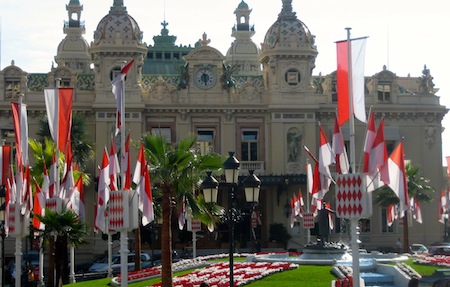Monaco, the glamorous principality of just 35,000 people nudged along the French Riviera and the world’s second smallest state by area (only the Vatican, which will also soon elect a new head of state, is smaller) held elections Sunday for its 24-member Conseil National (National Council).![]()
Even in a prosperous place like Monaco, with a GDP per capita of over $132,o00, Europe these days is not the friendliest electoral turf for incumbents, delivering a lopsided victory to the more conservative Horzion Monaco, restoring the once-dominant party to power after a decade in opposition.
Economic opportunity played some role in the victory — in a country where the unemployment rate is 0% and nearly two-thirds of Monaco’s workers are imported from nearby France, the opposition leader decried that 15 individuals were unemployed (compared to the 26% of Spaniards currently out of work).
Politics in Monaco is guided under the framework of a democratic monarchy, with the prince of Monaco serving as head of state (since April 2005, Albert II) and the minister of state serving as the head of government, presiding over a five-member council of government appointed by the prince of Monaco. Until 2002, the minister of state was a French citizen appointed by the prince of Monaco in collaboration with the French government — though the minister of state can now be Monegasque as well, the incumbent is Michel Roger, who is nonetheless a Frenchman.
Sunday’s elections, however, won’t change the minister of state, though it has see-sawed control over Monaco’s legislative body, the National Council, which must approve all Monegasque legislation.
Monaco features two major political parties and both are fairly conservative (as you might expect in a place like Monaco) — the relatively more conservative Horizon Monaco, a coalition formerly known as the Rally for Monaco / National and Democratic Union, which dominated Monaco’s government from the 1960s until the 2003 election, which swept the more centrist Union Monégasque (Union for Monaco) into power.
The Union Monégasque, under the leadership of Stéphane Valeri and, since 2010, Jean-François Robillon, remained in power after the 2008 elections, retaining its lopsided majority in the National Council (21 seats to just three for Horizon Monaco).
On Sunday, however, voters made yet another u-turn, restoring Horizon Monaco to power, under the leadership of Laurent Nouvion, after a decade of opposition, winning 20 out of 24 seats to just three for the Union Monégasque.
A new third party, Renaissance, formed to serve the interests of the employees of the Société des Bains de Mer, the largest employer in Monaco and a key business for tourism and gambling in Monaco (it’s owned 35% by the state, 35% by the Grimaldi royal family and 26% publicly), which owns, among many other assets, Monaco’s landmark Casino de Monte-Carlo (pictured above).
Despite Monaco’s small size and tiny population (36,000 people), it holds an idiosyncratic place in foreign affairs and comparative politics. It’s been independent under the control of the Grimaldi royal family since 1489, though France and Monaco have had a special relationship throughout the centuries and, in treaties signed in 1919, 1945 and 1963, France and Monaco have agreed that the French government is responsible for Monaco’s defense and that the two nations will share a mutual legal regime.
Monaco has given France problems most recently with respect to its role as an international tax haven — the country has cleaned up its reputation and toughened up its anti-money laundering laws since 2009, when it was initially named on the OECD’s ‘gray list’ of tax havens that weren’t compliant with international standards. But the country still levies no income tax upon its residents or upon international businesses resident in Monaco (although companies with 25% of their business outside Monaco are taxed at French rates).
Though Monaco is not a member of the European Union, it is a member of a customs union with France and it replaced the Monegasque franc with the euro in 2002 and, because it has no border controls with France, is a de facto member of the free-movement Schengen area as well.
Nouvion is expected to take over as president of Monaco’s National Council later in February.
Photo credit to Kevin Lees — Casino de Monte-Carlo, October 2005.
